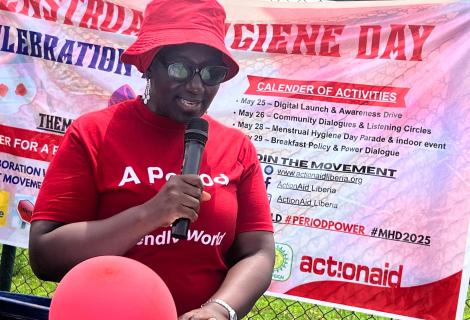ActionAid Liberia Calls for Urgent Policy Reform on Menstrual Hygiene Day!

ActionAid Liberia Calls for Urgent Policy Reform on Menstrual Hygiene Day�
ActionAid Liberia is calling for the removal or significant reduction of tariffs on menstrual hygiene products, describing the issue as one of gender justice, education, and economic development.
Speaking on behalf of Country Director Actionaid Liberia's Busness Development Manager, Madam Victoria Torlo Koiquah, sent out passionate plead during the national program held in Monrovia on May 8.
“Today, we gather not just to celebrate progress, but to amplify the voices of girls and women who are too often silenced by stigma, poverty, and systemic neglect, particularly when it comes to menstrual health and hygiene,” Koiquah stated.
She highlighted the grim reality of how many Liberian girls face, especially in rural and semi-urban areas, where over 60% do not have access to basic menstrual hygiene materials, the lack of safe and clean water in school to care for themselves during their period often lead to monthly school absenteeism.
She referenced UNICEF data indicating that one in ten African girls miss school during menstruation, with some dropping out altogether due to their lack of access to sanitary or menstrual products to manage their menstruation.
“For Liberian girls, the lack of access to clean and safe sanitary facilities, especially in public schools and marketplaces, continues to limit their dignity, mobility, and opportunities.” she said.
Koiquah described menstrual products as a basic human right that remains a luxury for many due to high import tariffs. “Globally, it’s estimated that 500 million women and girls lack access to adequate menstrual hygiene management. Here in Liberia, high import tariffs on menstrual products make them unaffordable to the vast majority of low-income households,” she emphasized.
“Let us be clear; menstrual health is not just a health issue, it is a matter of gender justice, education, and economic development,” she declared to resounding applause.
Our month-long observance of Menstrual Hygiene Day has been part of our Just and Equal Communities Project, which engaged young feminist leaders in grassroots dialogues and national campaigns. Activities included community listening circles, a digital awareness launch on May 25, and planned community dialogues hosted by the Young Feminist Movement on May 26.
At these listening circles, about 113 young women and boys were able to openly learn about menstrual health and hygiene, the need to support women during their period, and how men and boys can be ambassadors in seeking the protection and advancement of girls, and then spread the awareness to their peers.
During the digital launch, participants ranging from civil society organizations and He4She allies to youth advocates and feminist leaders engaged in critical conversations about menstrual health and equity, while a powerful one-minute awareness video and social media campaign amplified the call for policy reform.
Koiquah concluded her address with a passionate appeal for action: “We commend ongoing efforts but urge stronger, faster action. We must end the silence. We must end the shame. And we must build a Liberia where no girl is held back simply because she menstruates.”
She urged all stakeholders to sustain the dialogue and push for tangible changes. “Let’s continue to discuss and address the issues of menstrual health and hygiene to improve the lives of our girls and women, especially those in rural and hard-to-reach areas,” she said.
As ActionAid Liberia pushes forward with its campaign, the message is clear: menstrual equity is not a luxury, but a necessity, and one that Liberia can no longer afford to ignore.
Speaking for the Ministry of Gender, Children and Social Protection, Deputy Laura Golakeh reaffirmed the government’s commitment to menstrual health, announcing a new initiative to establish “pad banks” in schools.
The “Pads Bank,” he told the audience, will provide free menstrual products to girls across public schools, reduce girls' school dropout and protect girls' education, and promote school retention.
“Apart from all the big talks, we want to take action, and so one of the actions of today’s celebration will be the launch of our pad banks in most of our public schools in the country. Golakeh said.
She continued as saying “The pads bank will be somewhere, where if you are menstruating and you are in school you will be able to go there and get a pad and use it without paying a cent, and girls don’t have to cut their school days short because their menstruation started coming while in school.”
Golakeh’s remarks and announcement of this new initiative, which is expected to be launched soon was greeted with cheers from young women at the program.
We are a human rights and social justice organization operating in Liberia since 1997 to advance the rights of women, children, young people, excluded and marginalized communities and shift the development paradigm to one that is people-centered, utilizing our human rights-based approach (HRBA) and an intersectional feminist analysis across all programs, campaigns, policy, advocacy and partnerships. In taking sides with the most excluded, this has meant that AAL is often present in rural and physically hard-to-reach communities